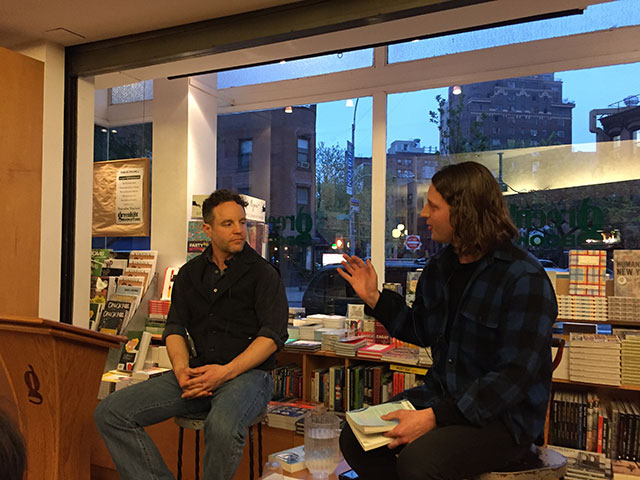
Literary blog Largehearted Boy hosted Brendan Jones and Will Chancellor as part of the ongoing Literary BFFs series. Jones launched his debut novel The Alaskan Laundry last month about a young woman from Philadelphia heading to Alaska to work her way through the fishing industry. Chancellor’s novel, A Brave Man Seven Storeys Tall, follows an injured Olympian as he runs away from the life planned for him by his father.
The protagonist of The Alaskan Laundry is Tara Marconi, a woman from an Italian family in Philadelphia. She leaves the family bakery to work in Alaska employed in various aspects of the fishing industry including canning and crabbing.
Like Tara, Jones worked in the canning industry. Canning is an outdated term, and he says it is now called seafood processing. During the high season, workers spend sixteen hours a day in the factory. At least the money is good.
Jones also worked on a tender. Fishing tenders remain anchored in place and are responsible for staying in contact with the markets, tracking prices, and buying fish off of fishing trawlers. Trawlers are small boats responsible for actually fishing.
Crabbing boats are as good as it gets when it comes to pay. Jones says they are like construction jobs that pay well–there is lots of money, but workers are paid highly because it is also dangerous. When he was writing the novel, he says the crabbing scene was the easiest to write because it was the aspect of fishing he had the least experience with.
When Jones was 19, he left civilization to live in the woods of Alaska for nine months. He wanted to get out of the city and also find the craziest, most difficult thing to do. The Alaskan wilderness was on top of the list.
Both of Jones’s parents were journalists. He says the word was primal for him growing up. However, he didn’t pursue in MFA and his formal writing instruction comes from his time as a Stegner Fellow.
He, like his protagonist Tara, is fascinated by machines. He says to understand how they function is a revelation. It blew his mind to see people who could just know how to fix mechanical objects, what wrench size was needed. He now lives on a tugboat in an Alaskan bay.
Early drafts of the novel contained a lot more mechanical descriptions. “I really geek out on the engine sections,” he says.
There was a reason he wrote a lot about the mechanics of fishing boats: “Since I was a kid, when I didn’t understand something, I wrote about it.”
He says it intrigues him to figure out how a thing functions. Many of those sections were eventually edited out of the novel. People don’t want to read about a tugboat engine technical manual, he jokes.
Tara developed as the protagonist at the time. Jones didn’t set out to write about a female protagonist. He describes her as simply the last character standing as he edited the novel down.
Chancellor describes the narrative as creating a Darwinian sensibility in Alaska where only the fittest survive.
Part of that is about finding your way into the community, Jones says, adding that it is easy to marginalized if you don’t.
For Tara, her arrival in Alaska is marked by some preconceived notions of the place. It shocks her to find an Alaskan with a bumper sticker that reads “Cut, Kill, Dig, Drill.” Jones took that from a real bumper sticker he saw. He says Alaska is often a real shock for mainlanders to suddenly be connected to nature in a different way. All residents of Alaska are cut a check from the government as compensation for the oil and gas in the state, so for an Alaskan, drilling means money.
The idea of the Alaskan laundry is one that suggests people come from soiled pasts hoping to clean themselves up before returning to civilization.
“A lot of people see Alaska as the last stop, for better or for worse,” Jones says.
He says for his part that when he was younger, he was really into the New York City scene, but for a lot of people in Sitka, Alaska, they don’t like the city.
When it comes to writing about experiences, Jones says there is a lot to be said for being and doing what you are writing about. The trick is not letting that become your life.
Brendan Jones and Will Chancellor
Tuesday, April 26, 2016
Greenlight Bookstore